

Analyze this page using the TAPoRware tools.
Excerpt 12: The Deflowering of the Rose - Factum1
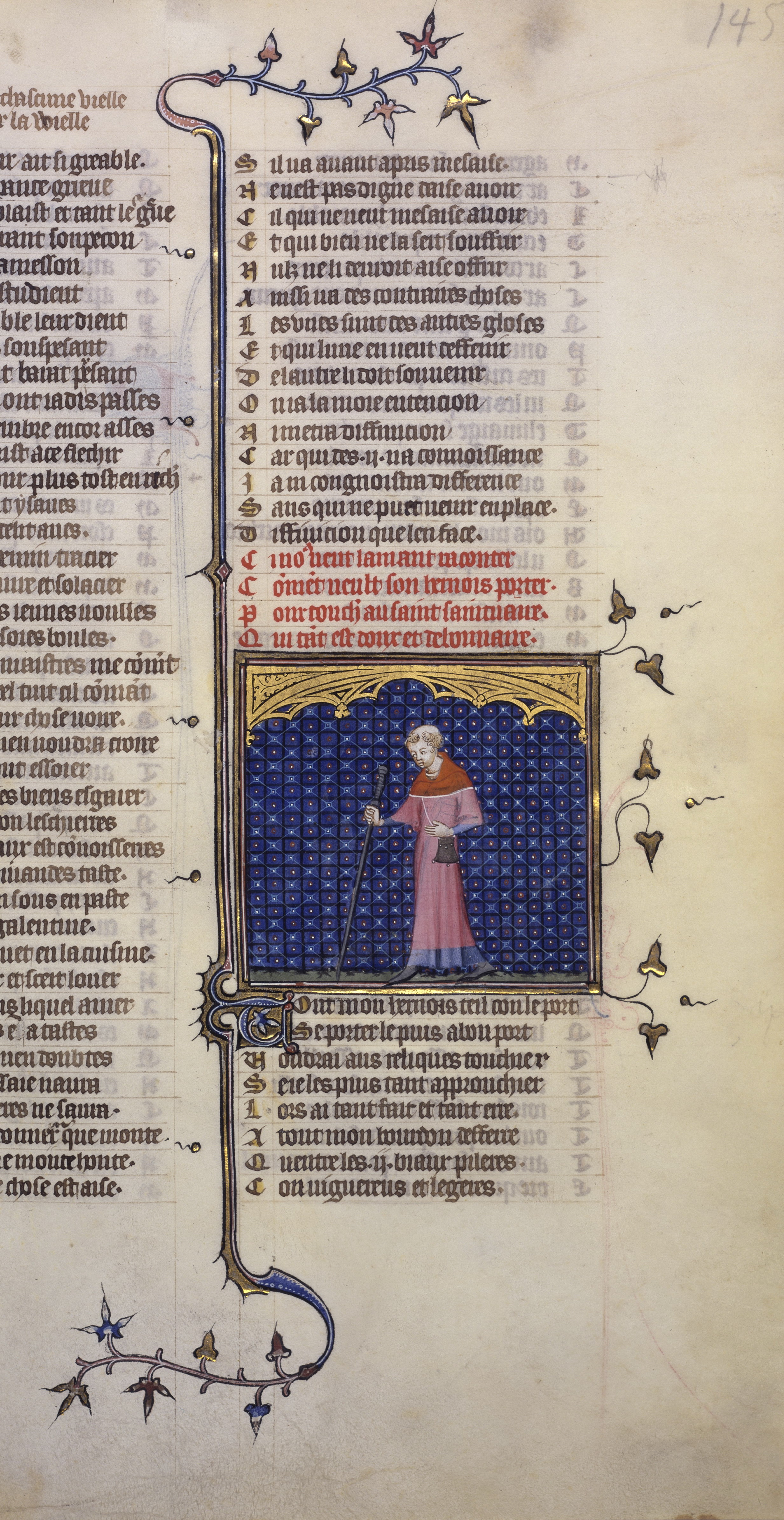
|
|
Folio 181ra |
|
|
Tout mon hernois, tel con jou port, se porter le puis jusqu'ou2 port,
voudrai au reliques touchier,
4 se je l'an puis tant aprouchier.Lors ai tant fet et tant erré
a tout mon bourdon defferré
qu'entre les ·ii· biaus pilerez,
8 con viguereus et legerez, m'agenoilloi san demourer,
car moult oi grant fain d'aourer
le biau saintuaire honorable
12 de queur devost et piteable; car tout iert ja tumbé par terre,
qu'au feu ne peut riens tenir guerre
que tout par terre mis n'eëst,
16 san ce que de riens i neüst. Trés an sus ·i· po la courtine
qui les reliques ancourtine;
del ymage lors m'apressai
20 que du saintuaire pres sai;moult la besai devostemant;
et por estuier sauvemant
vos3 mon bourdon metre en l'archiere,
24 ou l'escharpe pendoit darriere.Bien li cuidai lancier de bout,
mes il resort, et jou rebout;
|
I wanted to bring my entire harness, as I was carrying it, to the harbor, in order to have the relics touch it, if I could bring it close enough to them. So, I did so much and wandered so far, my staff entirely unprotected by ferrule, that, vigorous and agile, I knelt without delay between the two fair pillars, for I was very hungry to worship the beautiful sanctuary so worthy of honor with a devoted and pious heart. Everything had been razed by the fire, with which nothing can war, so that nothing remained standing except the unharmed sanctuary. I raised the curtain a little which covered the relics and approached the image which I knew was close to the sanctuary. I kissed the image very devoutly and then, to enter the sheath safely, wished to put my staff into the aperture, with the sack hanging behind. I thought that I could shoot it in at the first try, but it came back out.
|
Folio 181rb |
|
|
mes riens ne vaut, tourjorz recule,
28 n'i peut antrer por chose nule;car ·i· paliz dedanz trouvai
que je bien sant, mespas nou vai,
don l'archiere ert dedanz hourdée
32 des lors qu'el fu primes fondée,auques pres de la bordeüre,
s'an iert plus fort et plus seüre.
Formant m'i convint assaillir,
36 souvant hurter, souvant faillir.Se bohourder m'i veïssiez, por quoi bien garde i preïssiez,
d'Herculés vos peüst mambrer
40 quant il voust Cacus desmambrer :·iii· foiz a sa port asailli,
·iii· foiz hurta, .iii. foiz failli.
·iii· foiz s'asist en la valee,
44 touz las, por ravoir s'alenee,tant ot soffert peine et travaill.
Et je, qui ci tant me travaill
que tretouz an tressu d'angoisse
48 quant ce paliz tantost ne froisse,sui bien, ce cuit, autant lassez
vconme Herculés, ou plus assez.
Tant ai hurté que toutevoie
52 m'aperçui d'une estroite voiepar ou bien cuite outrepasser,
mes le paliz m'esteut quasser.
Par la santele que i'ai dite,
56 Qui tant iert estroite et petite, |
I replaced it, but to no avail; it still recoiled. By no effort could it enter there, for I encountered a paling, which I felt but could not see. It had formed the fortification of the aperture, close to its border, from the time when it was first built; it made it stronger and more secure. I had to assail it vigorously, throw myself against it, failing repeatedly.
If you had seen me there jousting, you would have had to take good care of yourself and you would have been reminded of Hercules when he wanted to dismember Cacus. Three times he battered at his door, three times he hurled himself, three times he failed, three times he had to sit down in the valley because his struggle and labor were so great that he, completely spent, had to regain his breath. And I had worked so hard that I was covered with the sweat of anguish when I did not immediately break the paling, and I was indeed, believe it, as worn out as Hercules, or even more. Nevertheless, I attacked so much that I discovered a narrow passage through which I thought I might get beyond, but to do so I had to break the paling.
|
Folio 181va |
|
|
Par ou le passaige quis ai,
Le paliz au bourdon brisai;
Sui moi dedanz l'archiere mis,
60 Mes ie n'i antrai pas demis. Pesoit moi que plus n'i antraie,
Mes autre poair ne poaie.
Mes pour riens nule ne lessasse
64 Que le bourdon tout n'i passasse.Outre loi passé sanz demeure,
Mes l'escharpe dehors demeure
O les martelez rebillanz
68 Qui dehors ierent pendillanz. Et si m'en mis en grant destroit,
Tant trouvai le passage estroit,
Car largement ne fu ce pas
72 Que je trespassasse le pas. Et se bien l'estre du pas sé
Nus n'i avoit onques passé
Car g'i passai touz li premiers,4
76 N'encor n'iere coustumiers Li lieus de recevoir paage.
Ne sai s'il fist puis d'avantage
Autant aus autres comme a moi,
80 Mes bien vous di que tant l'amoiQue ie ne le poi onques croire,
Neïs se ce fust chose voire
Car nus de legier, chose amee
84 Ne mescroit, tant soit diffamee; Ne si ne le croi pas oncores.
Mes au mains sai ie bien que lores
|
By this path, narrow and small, where I sought passage, I broke down the paling with my staff and gained a place in the aperture. But I did not even enter halfway; I was vexed at going no farther, but I hadn't the power to go on. I would have relaxed for nothing until the entire staff had entered, so I pressed it through with no delay. But the sack, with its pounding hammers, remained hanging outside; the passage was so narrow that I became greatly distressed, for I had not freed any wide space. I knew the passage so well that I know that no one had ever crossed it: I was absolutely the first. The place was still not common enough to collect tolls. I don't know if, since then, it has done as much for others as it did for me, but I tell you indeed that I loved it so much that I could hardly believe, even if it were true, that the same favors had been given to others. No one lightly disbelieves what he loves, so dishonored would it be; but I still do not believe it.
|
Folio 181vb |
|
|
N'iert il ne fraiez ne batuz.
88 Et pour ce m'i suis anbatuz Que d'autre antree n'i a point
Pour le bouton cueillir a point.
Si saurez com ie me contins:5
92 Tant que a mon gre le bouton tinsLe fet orraiz et la maniere
Pour ce que le mestier vous iere
Quant la douce seson vandra
96 Seigneur vallet qu'il convandraQue vous ailliez cueillir les roses
Ou les ouvertes ou les closes.
Que si sagemant i ailliez
100 Que vous au cueillir ne failliezFetes si com vous morroiz fere
Se mieuz n'an savez a chief iere
Car se vous plus largetemant
104 Ou mieuz ou plus soutinemant?Poez le passage passer
San vous destraidre ne lasser
Si le passez en vostre guise
108 Quant vous auroiz la moie aperteTant aiez au mains davantage
Que je vous apraign mon usage
San riens prandre de vostre avoir
112 Si man tenez bon gre falloir.Quant giere ileuc si anpressiez Tant soit du rosier apressiez
Que mon vouloir poi les mains tendre
116 Au raiseaus par le bouton prendre |
At least I know for certain that at that time it was not a well-worn, beaten path. Since there was no other place whatsoever where I might enter to gather the bud, I hurled myself through that path. You shall know how I carried on until I took the bud at my pleasure. You, my young lords, shall know both the deed and the manner, so that if, when the sweet season returns, the need arises for you to go gathering roses, either opened or closed, you may go so discreetly that you will not fail in your collecting. Do as you hear that I did, if you know no better how to achieve your goal; for, if you can negotiate the passage better, more easily or deftly, without straining or tiring yourself, then do so in your way when you have learned mine. At least you will have the advantage that I am teaching you my method without taking any of your money, and for that you should feel grateful.
Cramped as I was there, I had approached so near to the rosebush that I could reach out my hands at will to take the bud from the branches.
|
Folio 182ra |
|
|
Bel acueill par dieu me plait
Qui nul outrage fet ni ait
Et ie li mis moult en couvant
120 Pour ce qu'il m'an parlaie souvantQue ia nule riens ne feroie
For sa volanté et la moie.
|
Fair Welcoming had begged me for God's sake to commit no outrage, and, because he begged me often, I promised him firmly that I would never do anything except his will and mine.
|
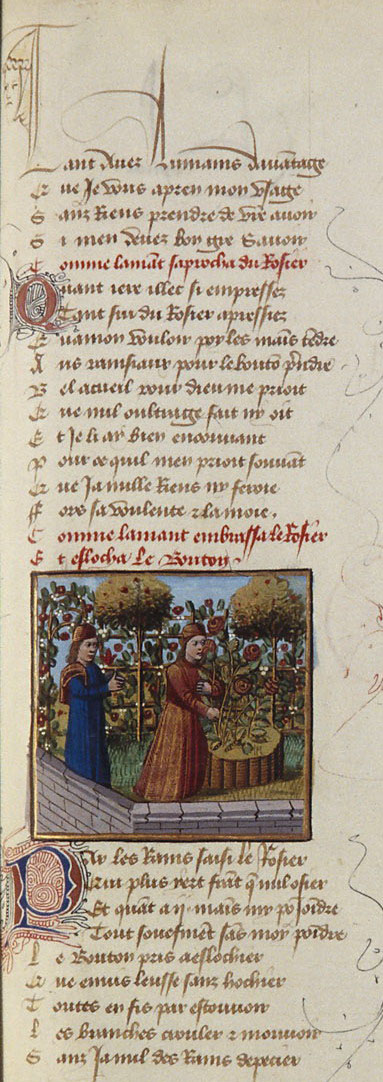
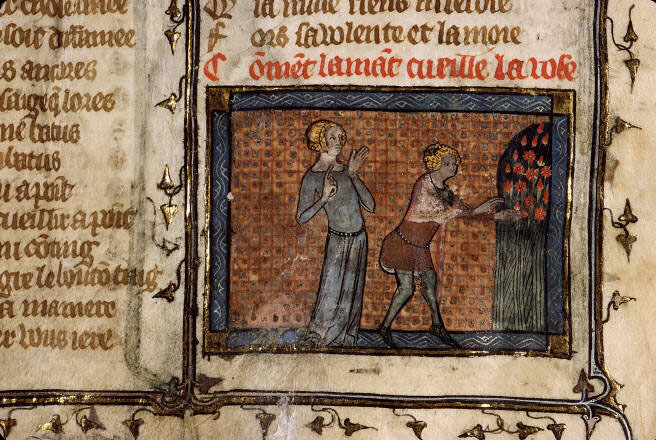
|
|
|
Par les rains saisi le rosier 124 Qui plus sunt franc que mil osier |
I seized the rosebush, fresher than any willow, by its branches,
|
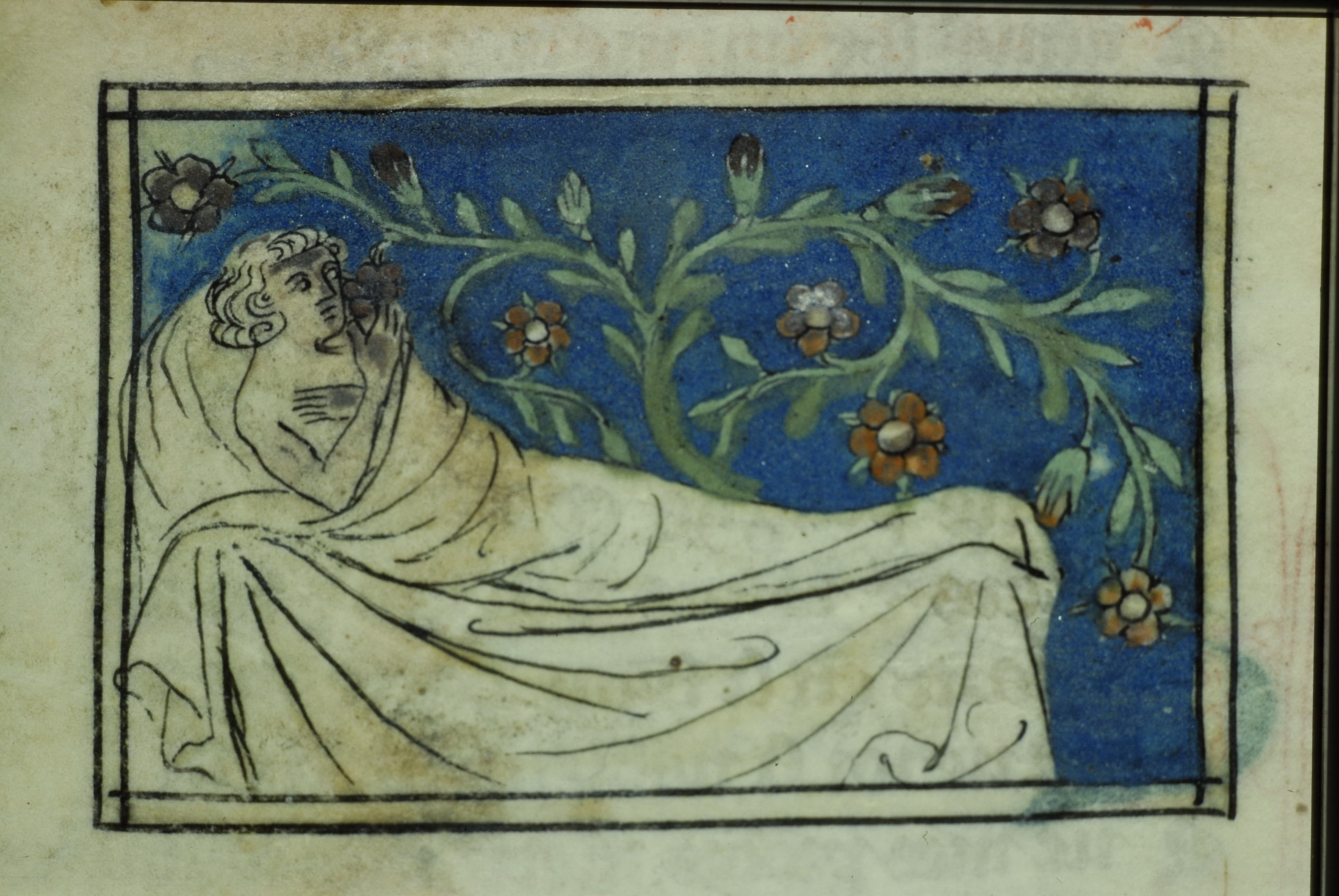
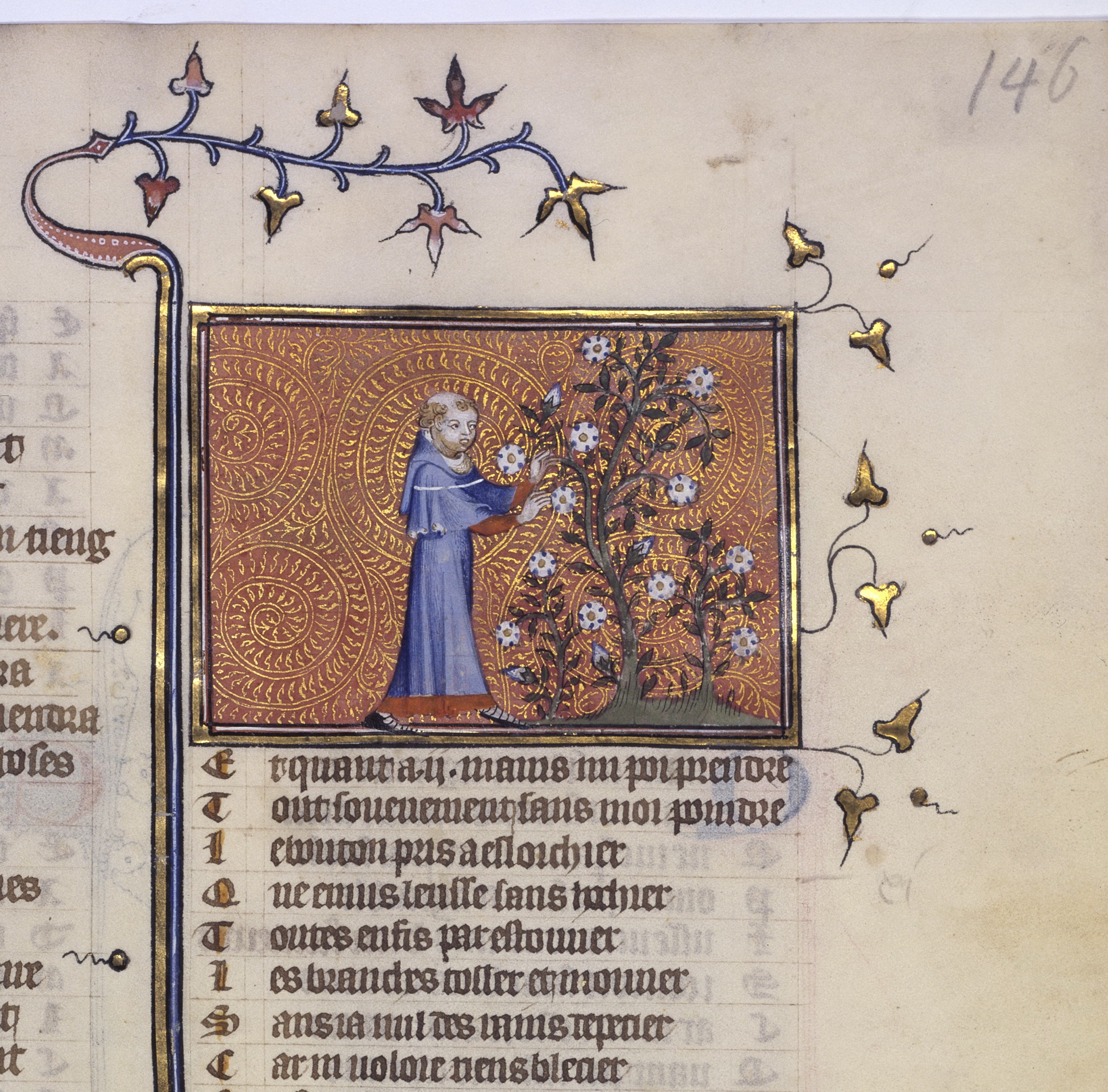
|
|
|
Et quant a ·ij· mains mi poi ioindre
Tretout soavet san moi poindre
Le bouton pris a essoichier
128 Que anuiz leusse san hoichierToutes an fis par estovoir
Les branches crosser et mouvoir
San ia nul des rains depecier
132 Car ni vouloie riens blecierEt si m'an conuit il afforce
Entamer ·i· po de l'escorce
Quautrement avoir ne savoie
136 Ce dont si grant desir avoieA la parfin tant vous an di ·j· po de greine i espandi
Quant i'oï le bouton esloichié
140 Ce fu quant dedanz l'oï toichiéPour les fueilletes renchier
Car ie vouloie tout cerchier
Jusques au fonz du boutonet
144 Si com moi samble que bon etSi fis lors si mesler les greines
Qu'el se desmellassent a peines
|
and when I could attach myself to it with both hands, I began very softly, without pricking myself, to shake the bud, since I had wanted it as undisturbed as possible. However, I could not help making the branches stir and shake, but I never destroyed any of them, for I wished to wound nothing, even though I had to cut a little into the bark; I did not know how otherwise to possess this gift, for which my desire was so strong.
Finally, I scattered a little seed on the bud when I shook it, when I touched it within in order to pore over the petals. For the rosebud seemed so fair to me that I wanted to examine everything right down to the bottom. As a result, I so mixed the seeds that they could hardly be separated;
|
Folio 182rb |
|
|
Si que tout le boutonet tandre
148 An fis ellargir et estandreVez ci tout quan que gi forfis
Mes de tant fui je bien lor fis
C'onques nul mau gré m'an sot
152 Li douz, qui nul n'i pansotAinz me consant et seuffre a fere
Quan qu'il set qui me doie plere
Si m'apele il de couvenant
156 Et li faz grant desavenantEt suis trop orgeus ce dit
Mes il ni met nul contredit
Qui ne praigne et tebaille et cueille
160 Rosier, et, rains, et fleur et fueille.Quand an si haut degre me vi Que i'oï si noblemant chevi
Que mes proces n'iert mes doutables
164 Pour ce que fins et agreablesFusse ver touz mes biens sereurs
Si com doit fere bons deteurs
Car moult estoie a eus tenuz
168 Quant par eus iere devenuzSi riche que pour voir le fiche
Richece n'estoit pas si riche
Au Dieu d'amours et a Venus
172 Qui m'orent aidié mieuz que nusPuis a touz les barons de l'ost
Don ie pour dieu qu'il ia ne l'ost
Des secours au fins amoureus
176 Antre les besiers savoureus |
and thus I made the whole tender rosebush widen and lengthen. All this I should not have done. But then I was quite certain that the sweet fellow who had no evil thought would bear me no ill will for it, and that he would agree to it and allow me to do whatever he knew might please me. He reminded me of the agreement and said that I was doing him a great wrong, that I was too unbridled; but he did not forbid me to take, to reveal and pluck the rosebush and branches, the flower and the leaf.
When I saw myself raised to such high degree, an estate gained so nobly that my methods were not suspect, because I had been loyal and open toward all my benefactors, as a good debtor should be - for I was very much bound to them, since through them I had become so rich that (I declare it as the truth) there was no wealth as rich - when I saw myself thus, I rendered thanks, among the delicious kisses, ten or twenty times, first to the God of Love and to Venus, who had aided me more than anyone, then to all the barons of the host, whose help I pray God never to take away from pure lovers.
|
Folio 182va |
|
|
Randi graces ·x· foiz ou ·xx·
Mes de reson ne me souvint
Que tant en moi gasta de peine
180 Maugré richece la vileineQui onques de pitié n'usa
Quant l'antrée me refusa
Du santeret qu'ele gardoit
184 De celui pas ne se gardoitPar ou ge fui ceanz venuz
Repostement les fauz menuz
Maugré mes mortex anemis
188 Grant m'orent arriere misEspeciaument ialousie
A tout son chapel de soussie
Qui des amanz les roses garde
192 Moult an fet ore bone gardeAinz que d'ileuc me remuasse
Ou mon veull oncor demourasse
Par grant ioliveté cueilli
196 La fleur du biau rosier fueilliAinsic oï la rose vermeille
A tant fu iorz et ie m'esveille.
|
But I didn't remember Reason, who gave me a lot of trouble for nothing. My curse on Wealth, the shrew, who showed no pity when she refused me entry by the path which she guarded. She took no care of that path by which I entered, secretly and hastily, here within. My curse too on those mortal enemies who held me back so long, especially on Jealousy, crowned with her marigolds of solicitude, who protects the roses from lovers. She is still keeping a very good watch.
Before I stirred from that place where I should wish to remain forever, I plucked, with great delight, the flower from the leaves of the rosebush, and thus I have my red rose. Soon it was day, and I awoke. |
EXPLICIT LA FIN DU ROMANZ DE LA ROSE
Notes
1This passage corresponds to lines 21587 to 21677 in Armand Strubel's edition where the last folio is missing and in Vol. III, lines 21553 to 21751 in Félix Lecoy's edition.
2a
3voill
4These lines are illegible in my base manuscript because of a dark stain. I used MS378 for this passage as well as Félix Lecoy's edition (Paris: Champion, 1970), vol. 3, ll. 21607-21750.
les martelez rebillanz
Qui dehors erent pendillanz.
Et si m'en mis en grant destroit,
Tant trouvai le passage estroit,
Car largement ne fu ce pas
Que je trespassasse le pas.
Et se bien l'estre du pas sé
Nus n'i avoit onques passé
Car g'i passai touz li premiers, . . .
Qui dehors erent pendillanz.
Et si m'en mis en grant destroit,
Tant trouvai le passage estroit,
Car largement ne fu ce pas
Que je trespassasse le pas.
Et se bien l'estre du pas sé
Nus n'i avoit onques passé
Car g'i passai touz li premiers, . . .
5BN ms 378 ends here.
